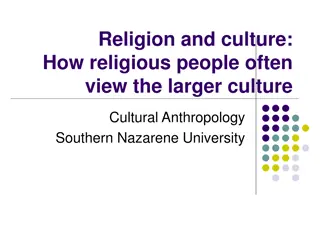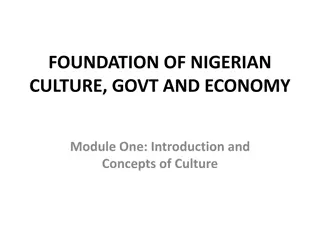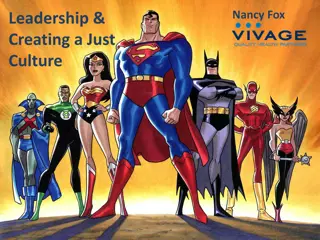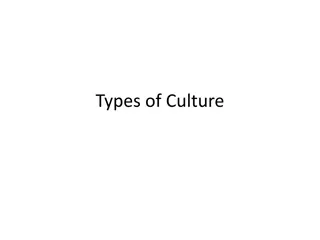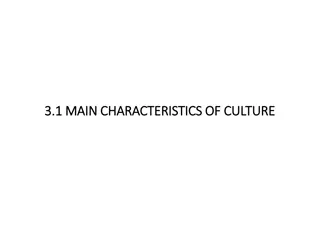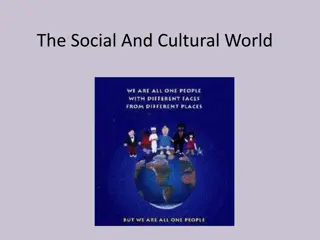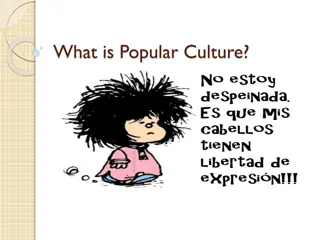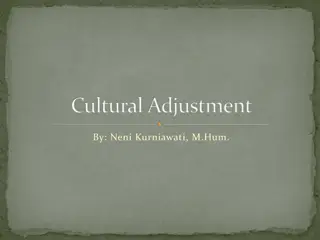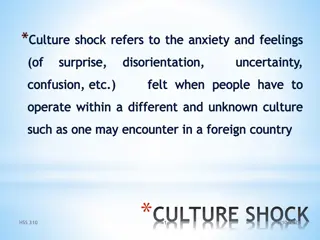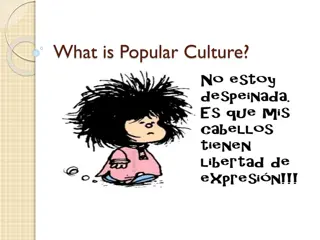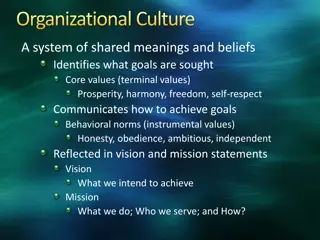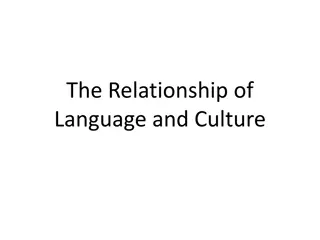Understanding Culture and Society
Culture and society are interconnected concepts, where culture encompasses beliefs, behaviors, and objects shared within a community, shaping their identity and values. Society, on the other hand, comprises individuals interacting based on common cultural bonds, whether ethnic, gender-based, or through shared activities. This relationship highlights how people define themselves, conform to societal norms, and contribute to a collective identity. Differentiating between high culture pursued by the upper class and low culture enjoyed by the working and middle classes illustrates diverse cultural expressions within societies globally.
Download Presentation

Please find below an Image/Link to download the presentation.
The content on the website is provided AS IS for your information and personal use only. It may not be sold, licensed, or shared on other websites without obtaining consent from the author. Download presentation by click this link. If you encounter any issues during the download, it is possible that the publisher has removed the file from their server.
E N D
Presentation Transcript
CULTURE AND SOCIETY 232 Najd
Culture and Society Culture consists of the beliefs, behaviors, objects, and other characteristics common to the members of a particular group or society. Through culture, people and groups define themselves, conform to society's shared values, and contribute to society. Thus, culture includes many societal aspects: language, customs, values, norms, mores, rules, tools, technologies, products, organizations, and institutions.
Culture and Society Popularly speaking, being cultured means being well educated, knowledgeable of the arts, stylish, and well mannered.
Culture and Society High culture generally pursued by the upper class refers to classical music, theater, fine arts, and other sophisticated pursuits. Members of the upper class can pursue high art because they have cultural capital, which means the professional credentials, education, knowledge, and verbal and social skills necessary to attain the property, power, and prestige to get ahead socially.
Culture and Society Low culture, or popular culture generally pursued by the working and middle classes refers to sports, movies, television sitcoms and soaps, and rock music. The definition of culture is different from the following terms: cultured, high culture, low culture, and popular culture.
Culture and Society Society is defined as the people who interact in such a way as to share a common culture. The cultural bond may be ethnic or racial, based on gender, or due to shared beliefs, values, and activities.
Culture and Society The term society can also have a geographic meaning and refer to people who share a common culture in a particular location. For example, people living in arctic climates developed different cultures from those living in desert cultures. In time, a large variety of human cultures arose around the world.
Culture and Society Culture and society are intricately related. A culture consists of the objects of a society, whereas a society consists of the people who share a common culture.
Culture and Ideology A distinction [is sometimes] made between culture which means actions and ideology the set of assumptions that condition why one acts as one does (although the terms are sometimes used interchangeably (culture used as shorthand for beliefs and action). Globalization, Language, and Culture by Richard E. Lee
Culture and Ideology just as there are no private languages, there are no private, personal ideologies. Hence these belief systems are socially shared by the members of a collectivity of social actors.
Culture and Ideology They [ideologies] control and organize other socially shared beliefs. Thus, a racist ideology may control attitudes about immigration, a feminist ideology may control attitudes about abortion or glass ceilings on the job or knowledge about gender inequality in society, and a social ideology may favour a more important role of the State in public affairs. Hence, ideologies are foundational social beliefs of a rather general and abstract nature. One of their cognitive functions is to provide (ideological) coherence to the beliefs of a group and thus facilitate their acquisition and use in everyday situations. Among other things, ideologies also specify what general cultural values (freedom, equality, justice, etc.) are relevant for the group.
Culture and Ideology Some Types of Ideologies: Ethical: Assumptions concerning right and wrong behavior. Political: Democracy. Aristocracy, Theocracy, Monarchy, etc. Epistemological: The nature of truth and means of finding it/ Faith vs. Reason Legal: Concepts of justice / Both the laws and means of enforcing them Economic: Distribution of wealth Gender: The proper role of men, women (and children) within a culture. Religious: Old Testament vs. New

 undefined
undefined



